Watched December 24-30, 2007 (part one): Aoi Miyazaki x 2 and Jun Ichikawa
Ao to shiro de mizuiro - Scenario Toryumon 2001 (Takahashi Naoharu, 2001)
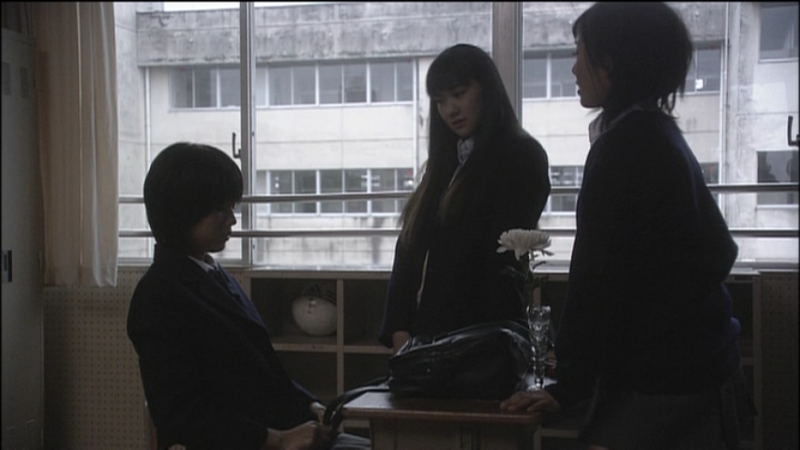 Aoi Miyazaki's second starring role was as an unhappy (and quite troubled) school girl in Akihiko Shiota's devastating (and outrageously under-appreciated) Gaichu / Harmful Insect (2001). In that film, her best friend was played by Yuu Aoi.
Aoi Miyazaki's second starring role was as an unhappy (and quite troubled) school girl in Akihiko Shiota's devastating (and outrageously under-appreciated) Gaichu / Harmful Insect (2001). In that film, her best friend was played by Yuu Aoi.  In this short (45 minute long) made-for-television movie, filmed not long after Gaichu, Aoi Miyazaki once again plays an unhappy school girl and Yuu Aoi plays her ex-friend. Moving from middle school to high school, Miyazaki got marked for generalized bullying by her classmates -- and her friend, eager to purge herself from the taint of the long prior friendship, is especially merciless.
In this short (45 minute long) made-for-television movie, filmed not long after Gaichu, Aoi Miyazaki once again plays an unhappy school girl and Yuu Aoi plays her ex-friend. Moving from middle school to high school, Miyazaki got marked for generalized bullying by her classmates -- and her friend, eager to purge herself from the taint of the long prior friendship, is especially merciless. 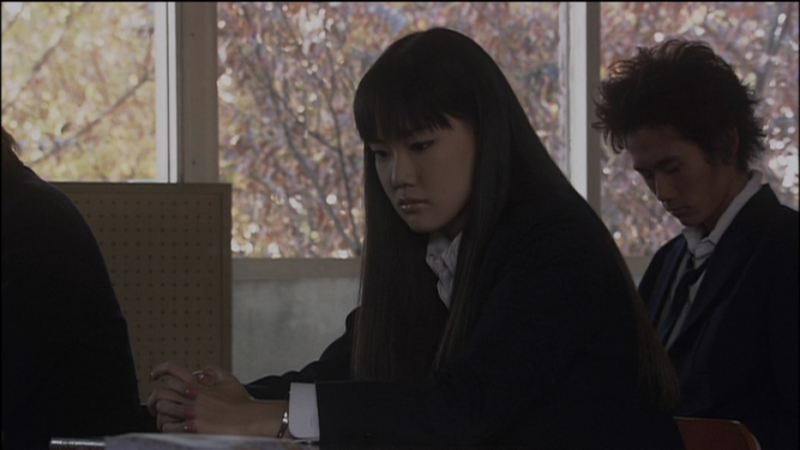 As a result, Miyazaki has only one remaining goal at school, to jimmy open the locked door to the school's roof and throw herself over the edge. The arrival of a new male student (payed by Shun Oguri), looked down on by others due to his juvenile delinquent past history, is viewed as an opportunity by Miyazaki
As a result, Miyazaki has only one remaining goal at school, to jimmy open the locked door to the school's roof and throw herself over the edge. The arrival of a new male student (payed by Shun Oguri), looked down on by others due to his juvenile delinquent past history, is viewed as an opportunity by Miyazaki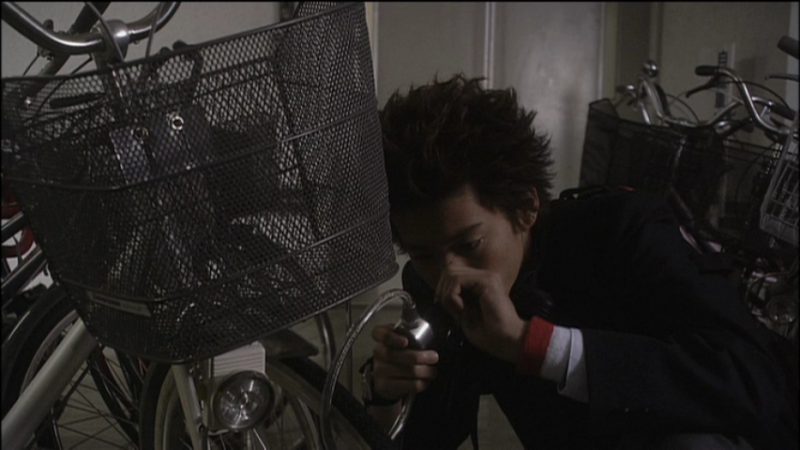 (as it turns out, he carries around a full kit of lock picking tools). When he gets beat up, following an attempt to "borrow" someone else's bike, Miyazaki is roused from her own deep funk to help him out.
(as it turns out, he carries around a full kit of lock picking tools). When he gets beat up, following an attempt to "borrow" someone else's bike, Miyazaki is roused from her own deep funk to help him out.
 While Oguri gives Miyazaki some burgling pointers, he doesn't open the door for her himself. And, as he figures out the depths of her depression, he seems to make certain that she will not succeed in her immediate goal (getting through the door),
While Oguri gives Miyazaki some burgling pointers, he doesn't open the door for her himself. And, as he figures out the depths of her depression, he seems to make certain that she will not succeed in her immediate goal (getting through the door), 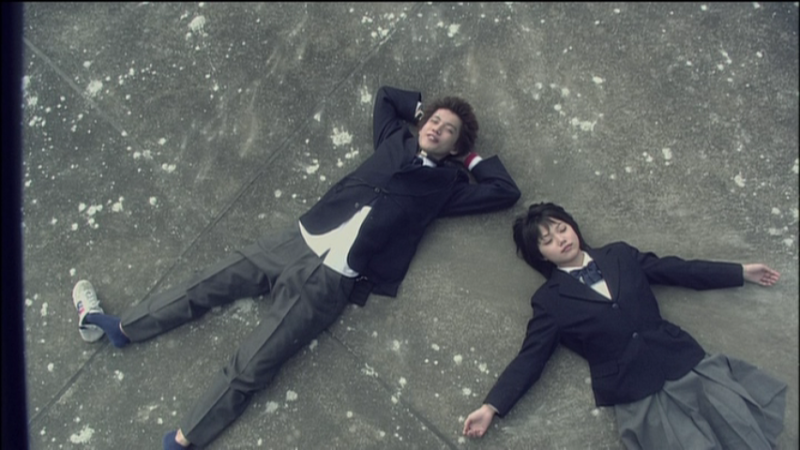 at least not when he is around to observe. Meanwhile, a new teacher is also worried about what she senses (though most harassment of Miyazaki takes place out of her sight). It seems that she had a good friend who took drastic action due to inability to tolerate bullying any longer.
at least not when he is around to observe. Meanwhile, a new teacher is also worried about what she senses (though most harassment of Miyazaki takes place out of her sight). It seems that she had a good friend who took drastic action due to inability to tolerate bullying any longer.
Naoharu, the director here (all his work until this past year seems to have been television-related), shot this in a mostly low-key fashion.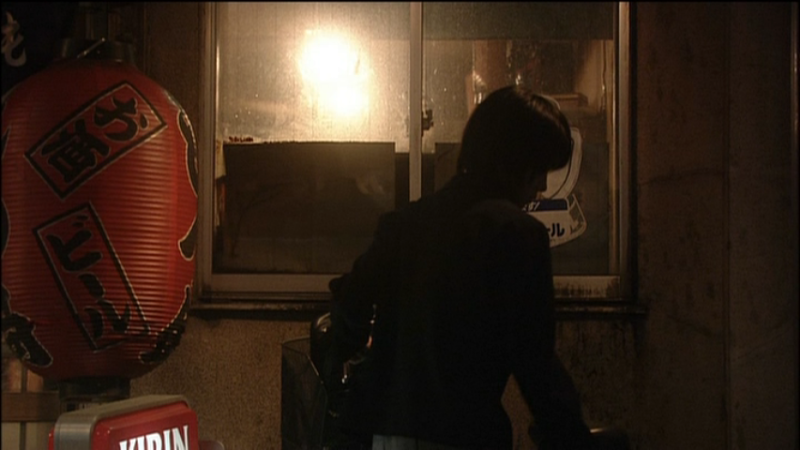 Performances are generally under-stated and naturalistic. The central focus here is on Aoi Miyazaki -- and she acquits herself well, presenting her character in a thoroughly convincing manner (with relatively little reliance on dialog). No subtitles on this Japanese DVD, but probably not needed a great deal in this case.
Performances are generally under-stated and naturalistic. The central focus here is on Aoi Miyazaki -- and she acquits herself well, presenting her character in a thoroughly convincing manner (with relatively little reliance on dialog). No subtitles on this Japanese DVD, but probably not needed a great deal in this case.
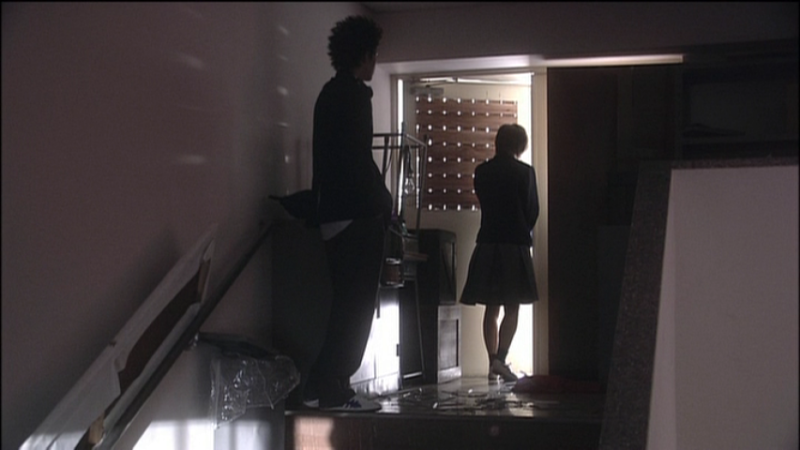 As to the name of this show, Scenario Toryumon seems to have been a series of films made on a once a year basis for several years. "Toryumon" means "dragon gate" -- but I am not certain what the reference might be to here (there is a wrestling organization of this name,
As to the name of this show, Scenario Toryumon seems to have been a series of films made on a once a year basis for several years. "Toryumon" means "dragon gate" -- but I am not certain what the reference might be to here (there is a wrestling organization of this name, 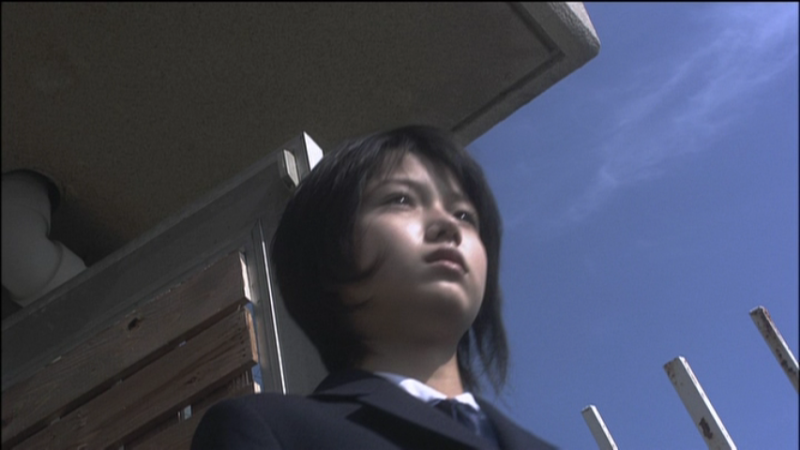 but I can't see any connection). "Ao to shiro de mizuiro" literally means something like "the color of water (light blue) is made from blue and white". I must confess, I am also not able to find any explanation of this phrase either.
but I can't see any connection). "Ao to shiro de mizuiro" literally means something like "the color of water (light blue) is made from blue and white". I must confess, I am also not able to find any explanation of this phrase either.
Hatsuyuki no koi: Virgin snow (HAN Sang-hee, 2007)
 Virgin Snow also stars Aoi Miyazaki, who is now a pretty young (married) woman. And she has graduated from playing middle school and high school students to playing college students. (However, in her current television series,
Virgin Snow also stars Aoi Miyazaki, who is now a pretty young (married) woman. And she has graduated from playing middle school and high school students to playing college students. (However, in her current television series, 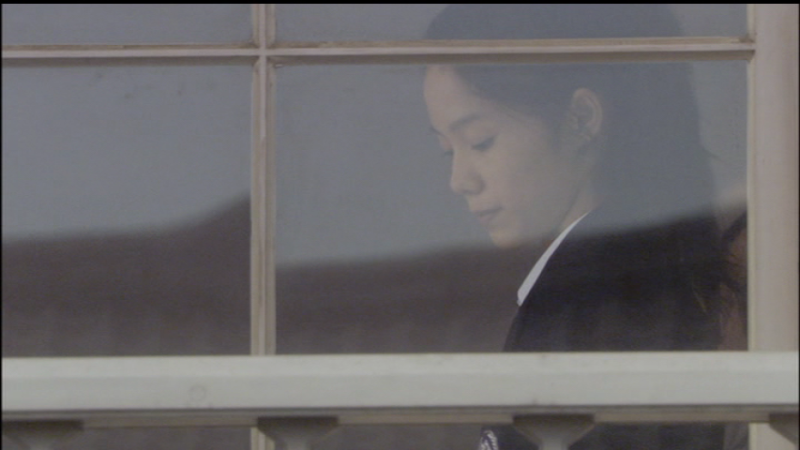 she has actually been promoted to being the wife of one of the last shoguns). Here, she plays the oldest of two daughters of a single mother, and who is both a student at Kyoto University and a kimono-clad attendant at a local temple.
she has actually been promoted to being the wife of one of the last shoguns). Here, she plays the oldest of two daughters of a single mother, and who is both a student at Kyoto University and a kimono-clad attendant at a local temple.
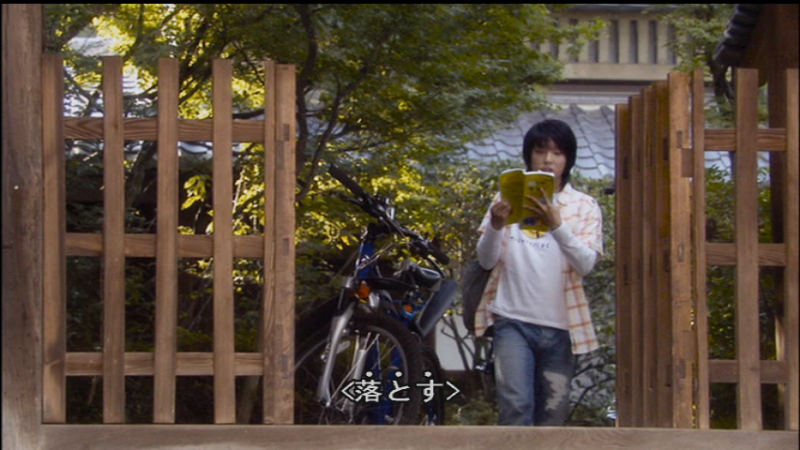 LEE Joon-ki is a currently much-in-demand young Korean actor (following his starring role in the 2005 King and the Clown ). He is undeniably very cute and charming. Here, he plays the son of a visiting professor teaching advanced pottery and ceramics making and a new transfer student at the university (despite his abysmal command of Japnaese). Of course, Miyazaki and Lee meet for the first time even before the credits --
LEE Joon-ki is a currently much-in-demand young Korean actor (following his starring role in the 2005 King and the Clown ). He is undeniably very cute and charming. Here, he plays the son of a visiting professor teaching advanced pottery and ceramics making and a new transfer student at the university (despite his abysmal command of Japnaese). Of course, Miyazaki and Lee meet for the first time even before the credits -- 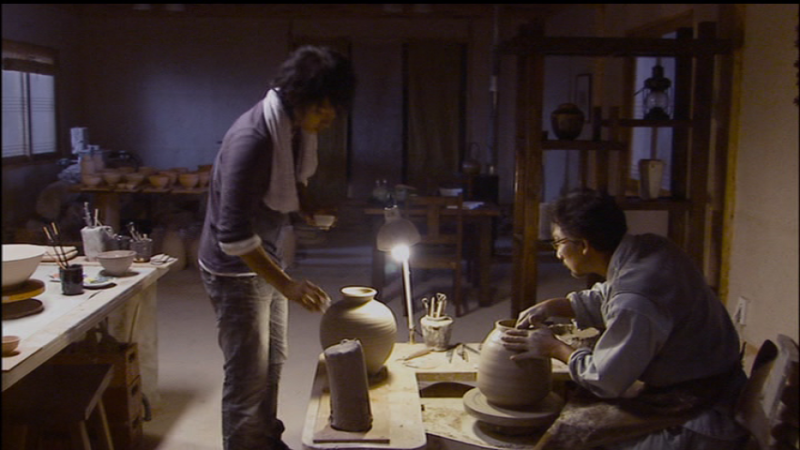 and the remainder of the film tracks the pair's vicissitudes. This film involves dialog in Japanese, Korean and (a bit of) English, making it yet another entry in the recent string of bilingual (or more) films featuring trans-Asian romances (possibly kicked off by the much more arty Last Life in the Universe).
and the remainder of the film tracks the pair's vicissitudes. This film involves dialog in Japanese, Korean and (a bit of) English, making it yet another entry in the recent string of bilingual (or more) films featuring trans-Asian romances (possibly kicked off by the much more arty Last Life in the Universe).
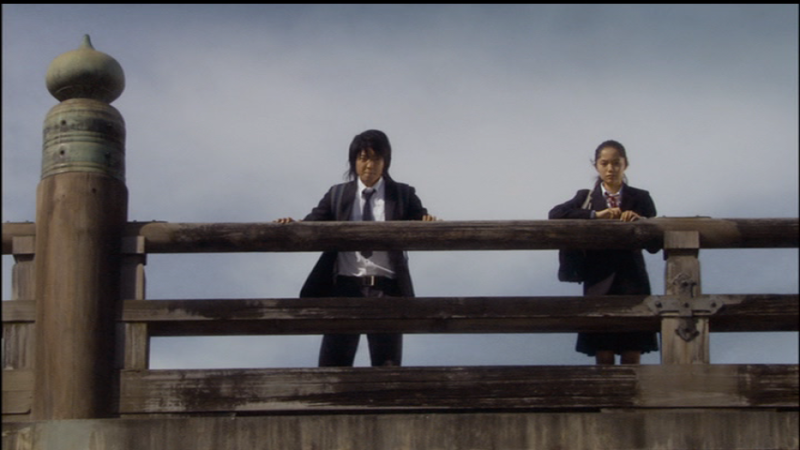 Director Han is extremely accomplished technically, and has a good sense of composition. But the story isn't especially believable and the plot (such as it is) is often rather trifling. Reality breaks in only occasionally --
Director Han is extremely accomplished technically, and has a good sense of composition. But the story isn't especially believable and the plot (such as it is) is often rather trifling. Reality breaks in only occasionally -- 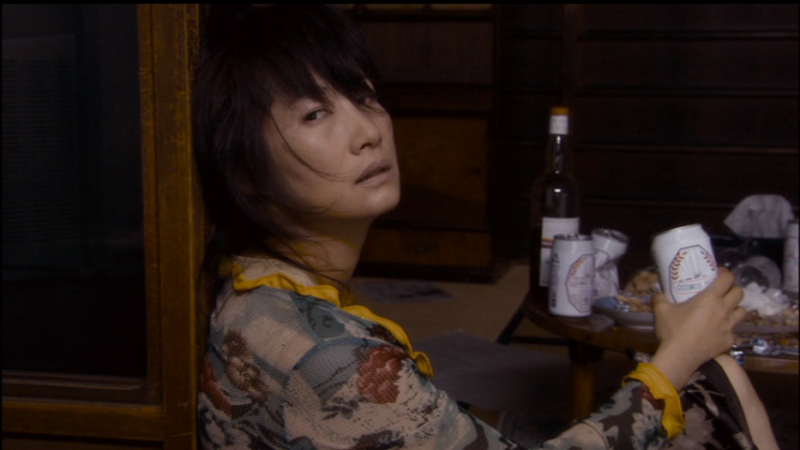 mostly in connection with the alcoholism of Miyazaki's mother (and her mother's abusive new boy friend). As it turns out, this bit of trauma serves mainly to separate the two young people for a (relatively long) while -- and is forgotten about thereafter.
mostly in connection with the alcoholism of Miyazaki's mother (and her mother's abusive new boy friend). As it turns out, this bit of trauma serves mainly to separate the two young people for a (relatively long) while -- and is forgotten about thereafter.
Unlike Heavenly Forest,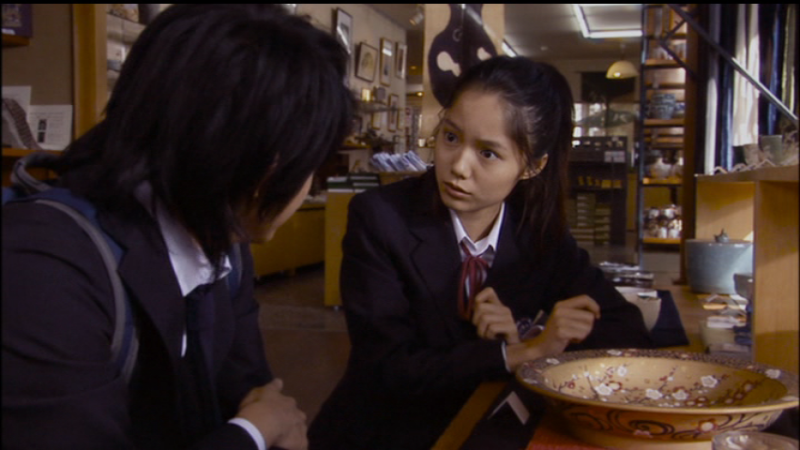 which was somewhat haphazardly directed and shot, but required Miyazaki to provide a bravura performance, here she mainly needed to be pretty and gracious -- but watching Aoi Miyazaki be pretty and gracious is scarcely a hardship. The Japanese DVD wound up not having English subtitles; accordingly, those unable to understand Korean will need to decipher the Japanese subtitles.
which was somewhat haphazardly directed and shot, but required Miyazaki to provide a bravura performance, here she mainly needed to be pretty and gracious -- but watching Aoi Miyazaki be pretty and gracious is scarcely a hardship. The Japanese DVD wound up not having English subtitles; accordingly, those unable to understand Korean will need to decipher the Japanese subtitles.
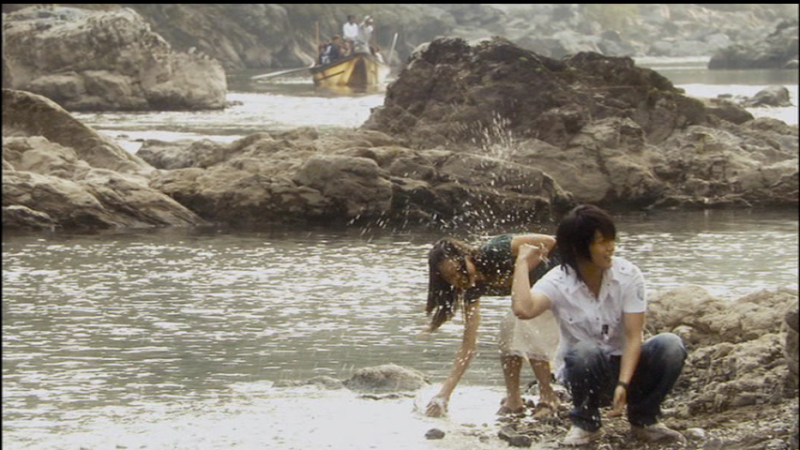 Aoi Miyazaki trivia. Currently (early February), 22-year old Miyazaki is simultaneously one of the stars of the most popular movie in Japan (Kagehinata ni saku) and the star (and title character) of the most popular television series (Atsu-hime).
Aoi Miyazaki trivia. Currently (early February), 22-year old Miyazaki is simultaneously one of the stars of the most popular movie in Japan (Kagehinata ni saku) and the star (and title character) of the most popular television series (Atsu-hime).
A few more screen shots:
http://i9.photobucket.com/albums/a59/mkerpan/aoi/hatsuyuki05.png
http://i9.photobucket.com/albums/a59/mkerpan/aoi/hatsuyuki09.png
http://i9.photobucket.com/albums/a59/mkerpan/aoi/hatsuyuki10.png
http://i9.photobucket.com/albums/a59/mkerpan/aoi/hatsuyuki11.png
http://i9.photobucket.com/albums/a59/mkerpan/aoi/hatsuyuki12.png
http://i9.photobucket.com/albums/a59/mkerpan/aoi/hatsuyuki14.png
http://i9.photobucket.com/albums/a59/mkerpan/aoi/hatsuyuki15.png
Ashita no watashi no tsukurikata / How To Become Myself (Jun Ichikawa, 2007)
Until the last week of the year, LEE Chang-dong's Milyang (Secret Sunshine) had no real competition for my pick as favorite film of the year.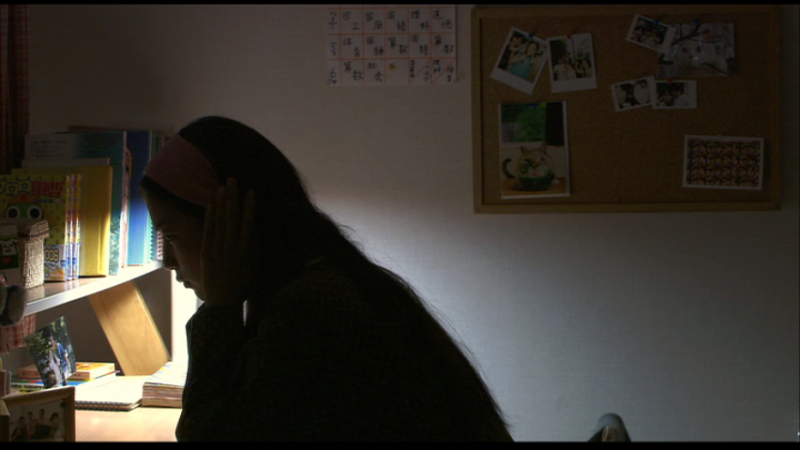 Then I got to see Jun Ichikawa's latest (largely ignored, as usual) film. While the issues in Ichikawa's new film are not so monumental as those in Lee's film, this story of two schoolgirls and their cell phones proved surprisingly moving.
Then I got to see Jun Ichikawa's latest (largely ignored, as usual) film. While the issues in Ichikawa's new film are not so monumental as those in Lee's film, this story of two schoolgirls and their cell phones proved surprisingly moving.
 Juri (Riko Narumi) and Hinako (Atsuko Maeda) are classmates, but not close friends. Juri is popular enough in middle school, while Hinako is a class leader -- until she falls from grace and becomes shunned and an object for (mild) bullying. Juri is troubled by what happens to her classmate, but not enough to take any risks on her behalf.
Juri (Riko Narumi) and Hinako (Atsuko Maeda) are classmates, but not close friends. Juri is popular enough in middle school, while Hinako is a class leader -- until she falls from grace and becomes shunned and an object for (mild) bullying. Juri is troubled by what happens to her classmate, but not enough to take any risks on her behalf.  However, on the last day of middle school, the two have a covert conversation in the library (safely seated at separate tables, lest someone else come and see them). After Juri apologizes for her cowardice and Hinako re-assures her that she didn't hold this against her, the two have a brief but heart-felt chat.
However, on the last day of middle school, the two have a covert conversation in the library (safely seated at separate tables, lest someone else come and see them). After Juri apologizes for her cowardice and Hinako re-assures her that she didn't hold this against her, the two have a brief but heart-felt chat.
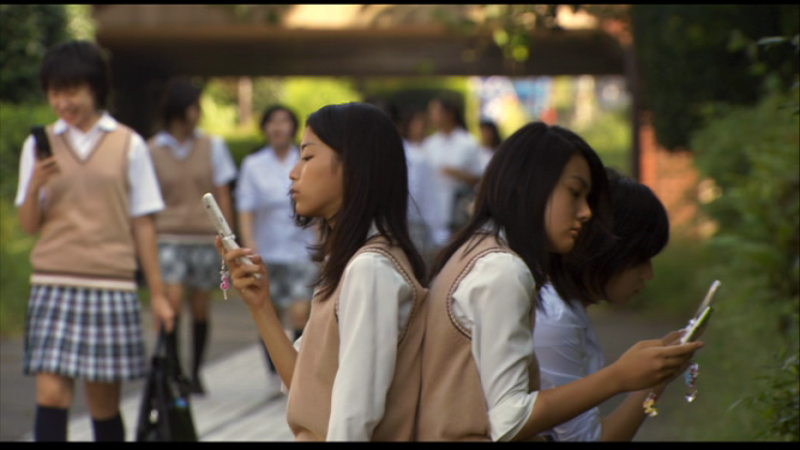 The two girls go their separate ways, not coming into contact because they attend different high schools, but one day Juri hears that Hinako is moving soon to another part of Japan. On a whim, Juri, whose once ideal home life has frayed
The two girls go their separate ways, not coming into contact because they attend different high schools, but one day Juri hears that Hinako is moving soon to another part of Japan. On a whim, Juri, whose once ideal home life has frayed 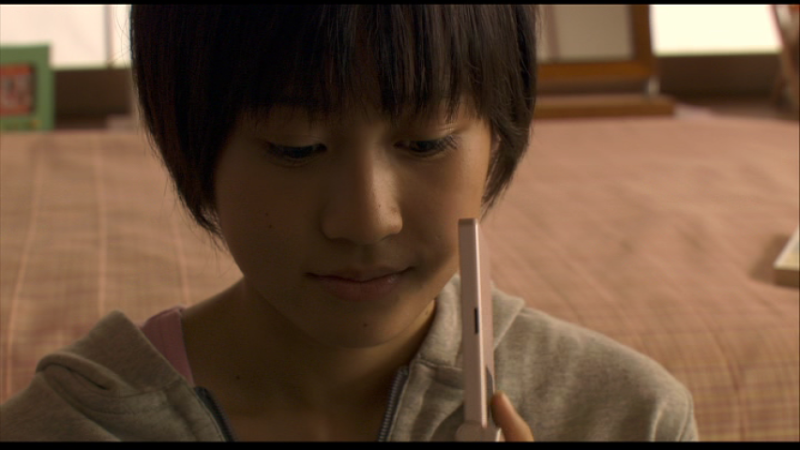 (due to the divorce of her parents), sends well-wishing text message to Hinako. Hinako, depressed at having to move (despite not fitting in all that well in her current school), pretends not to know who her correspondent is. Undeterred, Juri apologizes for sending mail to the wrong person by mistake -- but keeps on writing.
(due to the divorce of her parents), sends well-wishing text message to Hinako. Hinako, depressed at having to move (despite not fitting in all that well in her current school), pretends not to know who her correspondent is. Undeterred, Juri apologizes for sending mail to the wrong person by mistake -- but keeps on writing.  Hinako, a bit annoyed, can't resist writing back -- and eventually she comes to depend on Juri's messages (which re-traverse their middle school history, albeit in semi-fictionalized form, and provide advice on how to be popular in her new school). When Hinako meets a boy who seems to like her, Juri (who has never had a boyfriend herself) frantically pores over countless online advice columns in order to find suitable advice to pass on.
Hinako, a bit annoyed, can't resist writing back -- and eventually she comes to depend on Juri's messages (which re-traverse their middle school history, albeit in semi-fictionalized form, and provide advice on how to be popular in her new school). When Hinako meets a boy who seems to like her, Juri (who has never had a boyfriend herself) frantically pores over countless online advice columns in order to find suitable advice to pass on. 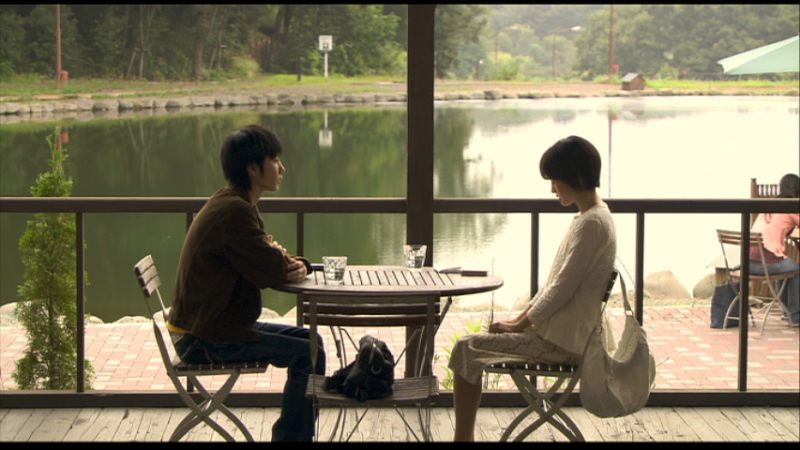 Throughout all the back and forth communication of the two girls, they never acknowledge that they actually knew each other once. While Juri's idealized vision of Hinako initially helps re-build her confidence (allowing her to become popular in her new school),
Throughout all the back and forth communication of the two girls, they never acknowledge that they actually knew each other once. While Juri's idealized vision of Hinako initially helps re-build her confidence (allowing her to become popular in her new school), 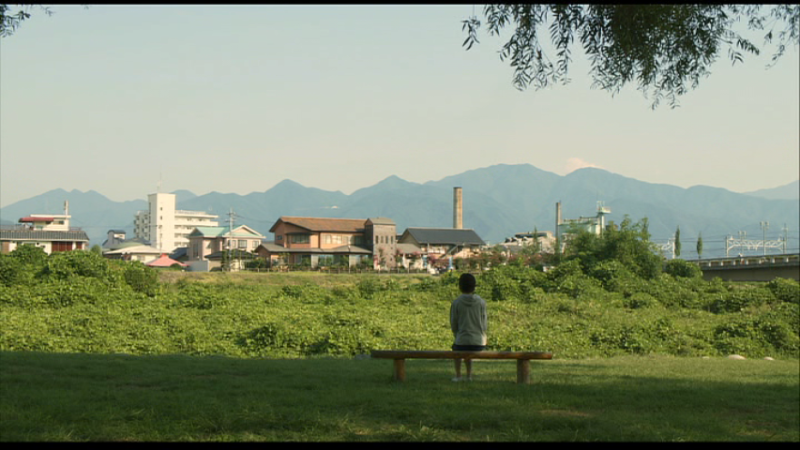 Hinako gradually finds it oppressive to keep acting up to Juri's ideals. Beyond this point, readers wanting to know how things turn out will have to watch the film for themselves (or send me an e-mail begging for personalized spoilers).
Hinako gradually finds it oppressive to keep acting up to Juri's ideals. Beyond this point, readers wanting to know how things turn out will have to watch the film for themselves (or send me an e-mail begging for personalized spoilers).
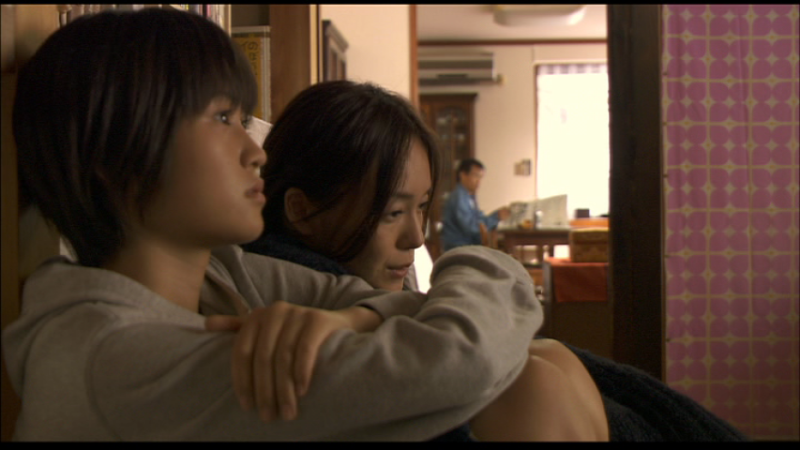 The supporting cast here (parents, siblings, clasmates, teachers) are uniformly good -- but the film rests mainly on the shoulders of its young heroines (particularly Narumi's Juri). Ichikawa moves the film at an often leisurely speed,
The supporting cast here (parents, siblings, clasmates, teachers) are uniformly good -- but the film rests mainly on the shoulders of its young heroines (particularly Narumi's Juri). Ichikawa moves the film at an often leisurely speed, 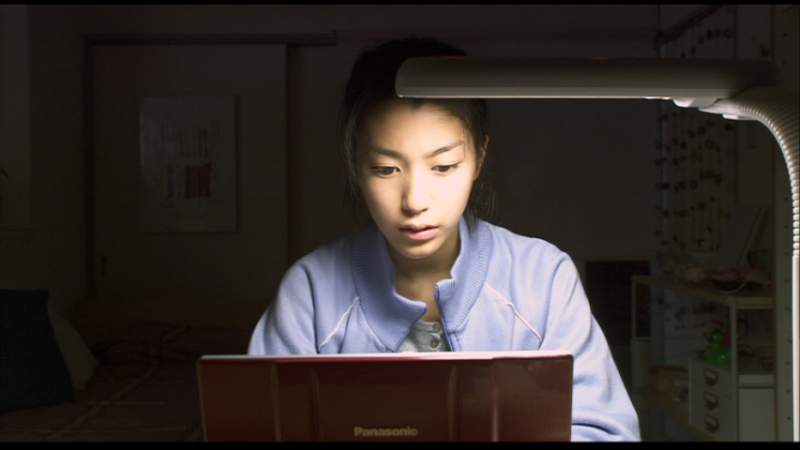 that nonetheless builds up considerable intensity with actions mainly consisting of reading and writing text messages. Although other films (such as Jeong's Take Care of My Cat and Iwai's All About Lily Chou-Chou) have featured cell phones and text messaging in prominent roles,
that nonetheless builds up considerable intensity with actions mainly consisting of reading and writing text messages. Although other films (such as Jeong's Take Care of My Cat and Iwai's All About Lily Chou-Chou) have featured cell phones and text messaging in prominent roles, 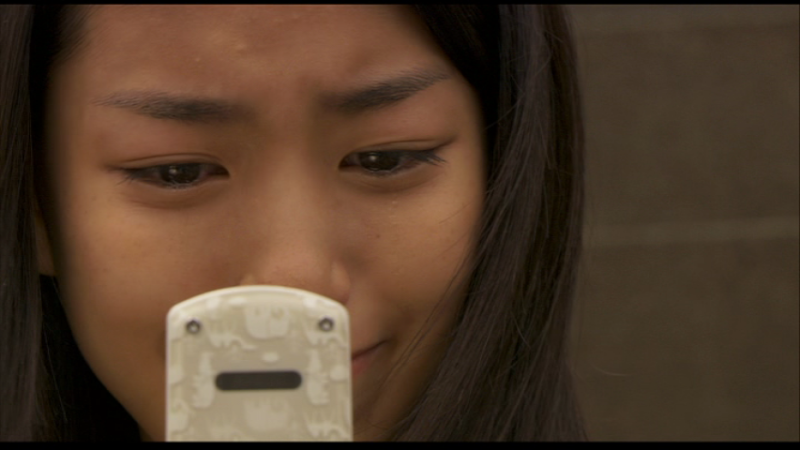 Ichikawa makes this modern form of written communication the primary focus of action here. As a result of the centrality of indirect communication, Ichikawa relies on split screens (and insets) from time to time -- something I do not recall him doing in any of the other eight films I've seen by him.
Ichikawa makes this modern form of written communication the primary focus of action here. As a result of the centrality of indirect communication, Ichikawa relies on split screens (and insets) from time to time -- something I do not recall him doing in any of the other eight films I've seen by him.
 Alas, the Japanese DVD of this film (like those of all of Ichikawa's films since Tokyo Marigold) lacks English subtitles. There apparently is a fan-subbed version floating about the ether, but I have not heard of any plans for a subbed commercial release anywhere.
Alas, the Japanese DVD of this film (like those of all of Ichikawa's films since Tokyo Marigold) lacks English subtitles. There apparently is a fan-subbed version floating about the ether, but I have not heard of any plans for a subbed commercial release anywhere.  (Ichikawa's previous film, the very fine Aogeba totoshi never got any sort of subbed release). One final word as to the title -- the literal rendition strikes me as a bit more appealing and evocative, something like "the way of making tomorrow's me".
(Ichikawa's previous film, the very fine Aogeba totoshi never got any sort of subbed release). One final word as to the title -- the literal rendition strikes me as a bit more appealing and evocative, something like "the way of making tomorrow's me".
 Aoi Miyazaki's second starring role was as an unhappy (and quite troubled) school girl in Akihiko Shiota's devastating (and outrageously under-appreciated) Gaichu / Harmful Insect (2001). In that film, her best friend was played by Yuu Aoi.
Aoi Miyazaki's second starring role was as an unhappy (and quite troubled) school girl in Akihiko Shiota's devastating (and outrageously under-appreciated) Gaichu / Harmful Insect (2001). In that film, her best friend was played by Yuu Aoi.  In this short (45 minute long) made-for-television movie, filmed not long after Gaichu, Aoi Miyazaki once again plays an unhappy school girl and Yuu Aoi plays her ex-friend. Moving from middle school to high school, Miyazaki got marked for generalized bullying by her classmates -- and her friend, eager to purge herself from the taint of the long prior friendship, is especially merciless.
In this short (45 minute long) made-for-television movie, filmed not long after Gaichu, Aoi Miyazaki once again plays an unhappy school girl and Yuu Aoi plays her ex-friend. Moving from middle school to high school, Miyazaki got marked for generalized bullying by her classmates -- and her friend, eager to purge herself from the taint of the long prior friendship, is especially merciless.  As a result, Miyazaki has only one remaining goal at school, to jimmy open the locked door to the school's roof and throw herself over the edge. The arrival of a new male student (payed by Shun Oguri), looked down on by others due to his juvenile delinquent past history, is viewed as an opportunity by Miyazaki
As a result, Miyazaki has only one remaining goal at school, to jimmy open the locked door to the school's roof and throw herself over the edge. The arrival of a new male student (payed by Shun Oguri), looked down on by others due to his juvenile delinquent past history, is viewed as an opportunity by Miyazaki (as it turns out, he carries around a full kit of lock picking tools). When he gets beat up, following an attempt to "borrow" someone else's bike, Miyazaki is roused from her own deep funk to help him out.
(as it turns out, he carries around a full kit of lock picking tools). When he gets beat up, following an attempt to "borrow" someone else's bike, Miyazaki is roused from her own deep funk to help him out. While Oguri gives Miyazaki some burgling pointers, he doesn't open the door for her himself. And, as he figures out the depths of her depression, he seems to make certain that she will not succeed in her immediate goal (getting through the door),
While Oguri gives Miyazaki some burgling pointers, he doesn't open the door for her himself. And, as he figures out the depths of her depression, he seems to make certain that she will not succeed in her immediate goal (getting through the door),  at least not when he is around to observe. Meanwhile, a new teacher is also worried about what she senses (though most harassment of Miyazaki takes place out of her sight). It seems that she had a good friend who took drastic action due to inability to tolerate bullying any longer.
at least not when he is around to observe. Meanwhile, a new teacher is also worried about what she senses (though most harassment of Miyazaki takes place out of her sight). It seems that she had a good friend who took drastic action due to inability to tolerate bullying any longer.Naoharu, the director here (all his work until this past year seems to have been television-related), shot this in a mostly low-key fashion.
 Performances are generally under-stated and naturalistic. The central focus here is on Aoi Miyazaki -- and she acquits herself well, presenting her character in a thoroughly convincing manner (with relatively little reliance on dialog). No subtitles on this Japanese DVD, but probably not needed a great deal in this case.
Performances are generally under-stated and naturalistic. The central focus here is on Aoi Miyazaki -- and she acquits herself well, presenting her character in a thoroughly convincing manner (with relatively little reliance on dialog). No subtitles on this Japanese DVD, but probably not needed a great deal in this case. As to the name of this show, Scenario Toryumon seems to have been a series of films made on a once a year basis for several years. "Toryumon" means "dragon gate" -- but I am not certain what the reference might be to here (there is a wrestling organization of this name,
As to the name of this show, Scenario Toryumon seems to have been a series of films made on a once a year basis for several years. "Toryumon" means "dragon gate" -- but I am not certain what the reference might be to here (there is a wrestling organization of this name,  but I can't see any connection). "Ao to shiro de mizuiro" literally means something like "the color of water (light blue) is made from blue and white". I must confess, I am also not able to find any explanation of this phrase either.
but I can't see any connection). "Ao to shiro de mizuiro" literally means something like "the color of water (light blue) is made from blue and white". I must confess, I am also not able to find any explanation of this phrase either.Hatsuyuki no koi: Virgin snow (HAN Sang-hee, 2007)
 Virgin Snow also stars Aoi Miyazaki, who is now a pretty young (married) woman. And she has graduated from playing middle school and high school students to playing college students. (However, in her current television series,
Virgin Snow also stars Aoi Miyazaki, who is now a pretty young (married) woman. And she has graduated from playing middle school and high school students to playing college students. (However, in her current television series,  she has actually been promoted to being the wife of one of the last shoguns). Here, she plays the oldest of two daughters of a single mother, and who is both a student at Kyoto University and a kimono-clad attendant at a local temple.
she has actually been promoted to being the wife of one of the last shoguns). Here, she plays the oldest of two daughters of a single mother, and who is both a student at Kyoto University and a kimono-clad attendant at a local temple. LEE Joon-ki is a currently much-in-demand young Korean actor (following his starring role in the 2005 King and the Clown ). He is undeniably very cute and charming. Here, he plays the son of a visiting professor teaching advanced pottery and ceramics making and a new transfer student at the university (despite his abysmal command of Japnaese). Of course, Miyazaki and Lee meet for the first time even before the credits --
LEE Joon-ki is a currently much-in-demand young Korean actor (following his starring role in the 2005 King and the Clown ). He is undeniably very cute and charming. Here, he plays the son of a visiting professor teaching advanced pottery and ceramics making and a new transfer student at the university (despite his abysmal command of Japnaese). Of course, Miyazaki and Lee meet for the first time even before the credits --  and the remainder of the film tracks the pair's vicissitudes. This film involves dialog in Japanese, Korean and (a bit of) English, making it yet another entry in the recent string of bilingual (or more) films featuring trans-Asian romances (possibly kicked off by the much more arty Last Life in the Universe).
and the remainder of the film tracks the pair's vicissitudes. This film involves dialog in Japanese, Korean and (a bit of) English, making it yet another entry in the recent string of bilingual (or more) films featuring trans-Asian romances (possibly kicked off by the much more arty Last Life in the Universe). Director Han is extremely accomplished technically, and has a good sense of composition. But the story isn't especially believable and the plot (such as it is) is often rather trifling. Reality breaks in only occasionally --
Director Han is extremely accomplished technically, and has a good sense of composition. But the story isn't especially believable and the plot (such as it is) is often rather trifling. Reality breaks in only occasionally --  mostly in connection with the alcoholism of Miyazaki's mother (and her mother's abusive new boy friend). As it turns out, this bit of trauma serves mainly to separate the two young people for a (relatively long) while -- and is forgotten about thereafter.
mostly in connection with the alcoholism of Miyazaki's mother (and her mother's abusive new boy friend). As it turns out, this bit of trauma serves mainly to separate the two young people for a (relatively long) while -- and is forgotten about thereafter.Unlike Heavenly Forest,
 which was somewhat haphazardly directed and shot, but required Miyazaki to provide a bravura performance, here she mainly needed to be pretty and gracious -- but watching Aoi Miyazaki be pretty and gracious is scarcely a hardship. The Japanese DVD wound up not having English subtitles; accordingly, those unable to understand Korean will need to decipher the Japanese subtitles.
which was somewhat haphazardly directed and shot, but required Miyazaki to provide a bravura performance, here she mainly needed to be pretty and gracious -- but watching Aoi Miyazaki be pretty and gracious is scarcely a hardship. The Japanese DVD wound up not having English subtitles; accordingly, those unable to understand Korean will need to decipher the Japanese subtitles. Aoi Miyazaki trivia. Currently (early February), 22-year old Miyazaki is simultaneously one of the stars of the most popular movie in Japan (Kagehinata ni saku) and the star (and title character) of the most popular television series (Atsu-hime).
Aoi Miyazaki trivia. Currently (early February), 22-year old Miyazaki is simultaneously one of the stars of the most popular movie in Japan (Kagehinata ni saku) and the star (and title character) of the most popular television series (Atsu-hime).A few more screen shots:
http://i9.photobucket.com/albums/a59/mkerpan/aoi/hatsuyuki05.png
http://i9.photobucket.com/albums/a59/mkerpan/aoi/hatsuyuki09.png
http://i9.photobucket.com/albums/a59/mkerpan/aoi/hatsuyuki10.png
http://i9.photobucket.com/albums/a59/mkerpan/aoi/hatsuyuki11.png
http://i9.photobucket.com/albums/a59/mkerpan/aoi/hatsuyuki12.png
http://i9.photobucket.com/albums/a59/mkerpan/aoi/hatsuyuki14.png
http://i9.photobucket.com/albums/a59/mkerpan/aoi/hatsuyuki15.png
Ashita no watashi no tsukurikata / How To Become Myself (Jun Ichikawa, 2007)
Until the last week of the year, LEE Chang-dong's Milyang (Secret Sunshine) had no real competition for my pick as favorite film of the year.
 Then I got to see Jun Ichikawa's latest (largely ignored, as usual) film. While the issues in Ichikawa's new film are not so monumental as those in Lee's film, this story of two schoolgirls and their cell phones proved surprisingly moving.
Then I got to see Jun Ichikawa's latest (largely ignored, as usual) film. While the issues in Ichikawa's new film are not so monumental as those in Lee's film, this story of two schoolgirls and their cell phones proved surprisingly moving. Juri (Riko Narumi) and Hinako (Atsuko Maeda) are classmates, but not close friends. Juri is popular enough in middle school, while Hinako is a class leader -- until she falls from grace and becomes shunned and an object for (mild) bullying. Juri is troubled by what happens to her classmate, but not enough to take any risks on her behalf.
Juri (Riko Narumi) and Hinako (Atsuko Maeda) are classmates, but not close friends. Juri is popular enough in middle school, while Hinako is a class leader -- until she falls from grace and becomes shunned and an object for (mild) bullying. Juri is troubled by what happens to her classmate, but not enough to take any risks on her behalf.  However, on the last day of middle school, the two have a covert conversation in the library (safely seated at separate tables, lest someone else come and see them). After Juri apologizes for her cowardice and Hinako re-assures her that she didn't hold this against her, the two have a brief but heart-felt chat.
However, on the last day of middle school, the two have a covert conversation in the library (safely seated at separate tables, lest someone else come and see them). After Juri apologizes for her cowardice and Hinako re-assures her that she didn't hold this against her, the two have a brief but heart-felt chat. The two girls go their separate ways, not coming into contact because they attend different high schools, but one day Juri hears that Hinako is moving soon to another part of Japan. On a whim, Juri, whose once ideal home life has frayed
The two girls go their separate ways, not coming into contact because they attend different high schools, but one day Juri hears that Hinako is moving soon to another part of Japan. On a whim, Juri, whose once ideal home life has frayed  (due to the divorce of her parents), sends well-wishing text message to Hinako. Hinako, depressed at having to move (despite not fitting in all that well in her current school), pretends not to know who her correspondent is. Undeterred, Juri apologizes for sending mail to the wrong person by mistake -- but keeps on writing.
(due to the divorce of her parents), sends well-wishing text message to Hinako. Hinako, depressed at having to move (despite not fitting in all that well in her current school), pretends not to know who her correspondent is. Undeterred, Juri apologizes for sending mail to the wrong person by mistake -- but keeps on writing.  Hinako, a bit annoyed, can't resist writing back -- and eventually she comes to depend on Juri's messages (which re-traverse their middle school history, albeit in semi-fictionalized form, and provide advice on how to be popular in her new school). When Hinako meets a boy who seems to like her, Juri (who has never had a boyfriend herself) frantically pores over countless online advice columns in order to find suitable advice to pass on.
Hinako, a bit annoyed, can't resist writing back -- and eventually she comes to depend on Juri's messages (which re-traverse their middle school history, albeit in semi-fictionalized form, and provide advice on how to be popular in her new school). When Hinako meets a boy who seems to like her, Juri (who has never had a boyfriend herself) frantically pores over countless online advice columns in order to find suitable advice to pass on.  Throughout all the back and forth communication of the two girls, they never acknowledge that they actually knew each other once. While Juri's idealized vision of Hinako initially helps re-build her confidence (allowing her to become popular in her new school),
Throughout all the back and forth communication of the two girls, they never acknowledge that they actually knew each other once. While Juri's idealized vision of Hinako initially helps re-build her confidence (allowing her to become popular in her new school),  Hinako gradually finds it oppressive to keep acting up to Juri's ideals. Beyond this point, readers wanting to know how things turn out will have to watch the film for themselves (or send me an e-mail begging for personalized spoilers).
Hinako gradually finds it oppressive to keep acting up to Juri's ideals. Beyond this point, readers wanting to know how things turn out will have to watch the film for themselves (or send me an e-mail begging for personalized spoilers). The supporting cast here (parents, siblings, clasmates, teachers) are uniformly good -- but the film rests mainly on the shoulders of its young heroines (particularly Narumi's Juri). Ichikawa moves the film at an often leisurely speed,
The supporting cast here (parents, siblings, clasmates, teachers) are uniformly good -- but the film rests mainly on the shoulders of its young heroines (particularly Narumi's Juri). Ichikawa moves the film at an often leisurely speed,  that nonetheless builds up considerable intensity with actions mainly consisting of reading and writing text messages. Although other films (such as Jeong's Take Care of My Cat and Iwai's All About Lily Chou-Chou) have featured cell phones and text messaging in prominent roles,
that nonetheless builds up considerable intensity with actions mainly consisting of reading and writing text messages. Although other films (such as Jeong's Take Care of My Cat and Iwai's All About Lily Chou-Chou) have featured cell phones and text messaging in prominent roles,  Ichikawa makes this modern form of written communication the primary focus of action here. As a result of the centrality of indirect communication, Ichikawa relies on split screens (and insets) from time to time -- something I do not recall him doing in any of the other eight films I've seen by him.
Ichikawa makes this modern form of written communication the primary focus of action here. As a result of the centrality of indirect communication, Ichikawa relies on split screens (and insets) from time to time -- something I do not recall him doing in any of the other eight films I've seen by him. Alas, the Japanese DVD of this film (like those of all of Ichikawa's films since Tokyo Marigold) lacks English subtitles. There apparently is a fan-subbed version floating about the ether, but I have not heard of any plans for a subbed commercial release anywhere.
Alas, the Japanese DVD of this film (like those of all of Ichikawa's films since Tokyo Marigold) lacks English subtitles. There apparently is a fan-subbed version floating about the ether, but I have not heard of any plans for a subbed commercial release anywhere.  (Ichikawa's previous film, the very fine Aogeba totoshi never got any sort of subbed release). One final word as to the title -- the literal rendition strikes me as a bit more appealing and evocative, something like "the way of making tomorrow's me".
(Ichikawa's previous film, the very fine Aogeba totoshi never got any sort of subbed release). One final word as to the title -- the literal rendition strikes me as a bit more appealing and evocative, something like "the way of making tomorrow's me".
Comments
- I'm tired to see her looking 5 years (more?) underaged. How do you want she express her talent if you give her a role that's nothing but a stereotype of herself ? (it can be OK when the movie's good, but I felt like Su-Ki-Da could have been a great "last schoolgirl role")
- I HATE Lee Yoon-Ki. He sure is cute, but he can't play (he can't chose a good movie neither !). In Virgin Snow he's worst than ever, he's not acting but posing for a kind of fan-club-limited photobook.
- the whole movie is a collection of clichés. As a romantic comedie of course, but also speaking of its representation of Japan and Korea (especially Japan), this movie is a postcard...
If fact I can't find one good reason to see this movie. Aoi? she's not that good (you don't know how it's painful to write that) and as a fan of her I'm in Hell while watching such a $%&#§@!.
But let's finish on a positive note, How to become myself was a good surprise indeed. I won't be as complimentary as you are, but the young actress is good and it's a quite clever movie, IMHO.
E.
I think you are demanding too much of "Virgin Snow". It was not an "art film" but rather a thoroughly commercial product. As such, it was well-executed (though it obviously could have been better). Because this was quite well-made technically, it is a shame that more effort was not expended on creating a first-rate script.
Miyazaki handled her part with dignity and professionalism. She gave the part her best efforts -- and didn't simply show up in order to collect a paycheck. I would rather see her get only projects at least as good as "Hatsukoi" -- but it is better for her to work than not work. (She will be tied up with her television series Atsu-hime for most of 2008, I suspect).
On the other topic -- I just don't see why we can't have more English-subbed Jun Ichikawa films available.